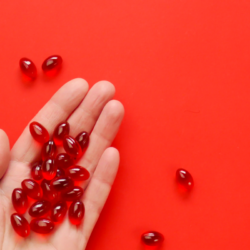Methylene blue is an organic compound of the thiazine class, widely recognised for its colouring properties and its various applications in chemistry and medicine. Discovered in the 19th century, this compound was initially used as a textile dye before finding medical uses. Historically, it has been used as a treatment for malaria, methaemoglobinaemia and to detect certain urinary tract infections. Thanks to its ability to penetrate cell membranes and interact with specific biological targets, methylene blue has demonstrated significant antioxidant and antimicrobial properties.
Disclaimer:
The information presented in this article is for informational purposes only and does not constitute medical advice, a therapeutic recommendation, or a specific dosage. While methylene blue is being explored for its potential effects on cellular aging, it is not a dietary supplement and must be used under appropriate medical supervision. Any therapeutic use must be preceded by professional medical advice.
In accordance with current legislation, our pharmacy does not offer any treatment protocols or usage duration for indications not approved by the ANSM.
In modern medicine, methylene blue is used for its effects on mitochondrial function, its role in reducing free radicals and its potential to improve ATP production. These characteristics have led to exploration of its potential as an anti-ageing drug.
Recent research indicates that methylene blue may play a key role in reducing oxidative stress, improving mitochondrial health and potentially prolonging cell longevity. These properties make this compound a subject of great interest in research into ageing and age-related degenerative diseases, suggesting that it could become a central element in anti-ageing strategies.
How does methylene blue affect cell ageing?
Methylene blue exerts a significant action by inhibiting free radicals, unstable molecules that cause oxidative damage to cells. Free radicals, mainly in the form of oxygen reagents, are generated during normal metabolic processes and in response to environmental stresses. They attack cellular components such as DNA, proteins and membrane lipids, contributing to cellular ageing and the progression of various age-related diseases.
Methylene blue, as an antioxidant, neutralises these free radicals by accepting or transferring electrons, thereby reducing their reactivity and preventing oxidative damage.
The antioxidant properties of methylene blue
Methylene blue has remarkable antioxidant properties that play a crucial role in cell protection. As an antioxidant, it plays a part in cellular defence systems against oxidative stress by regenerating other endogenous antioxidants such as glutathione and NADH. The compound also facilitates the reduction of reactive oxygen species (ROS) by accepting electrons from redox enzymes such as NADH dehydrogenase. By stabilising the cellular environment, methylene blue reduces levels of oxidative stress, which can delay the ageing process and improve long-term cell viability.
Role in mitochondria and ATP production
The role of methylene blue in the mitochondria is essential for its anti-ageing effect. Mitochondria, often referred to as the energy powerhouses of cells, are responsible for the production of ATP (adenosine triphosphate), the main source of cellular energy. Methylene blue improves mitochondrial function by facilitating the flow of electrons in the electron transport chain. It acts as an alternative electron carrier, reducing complex IV while increasing the efficiency of ATP production.
In addition, by reducing superoxide production in complex I, it reduces mitochondrial oxidative stress. This mechanism not only improves cellular energy efficiency but also protects against mitochondrial damage, thereby contributing to cell longevity and health.
Can methylene blue really prolong life and improve cognition?
Preclinical studies using animal models have shown that methylene blue can extend lifespan by improving mitochondrial function and reducing oxidative stress.
In rodent trials, administration of methylene blue led to a significant improvement in longevity. This is attributed to its ability to act as a protective agent for mitochondria, optimising ATP production and reducing the production of reactive oxygen species (ROS). The results indicate an increase in the average lifespan of the animals, as well as a reduction in signs of cellular ageing such as lipofuscin accumulation and cellular senescence.
How can cognitive function be improved?
Clinical and experimental research has shown that methylene blue treatment can significantly improve memory and cognition. Studies have shown that methylene blue improves performance in spatial memory and recognition tasks in animals, particularly in the Morris water maze tests.
These effects are attributed to its neuroprotective properties, which include reducing oxidative stress, modulating levels of phosphorylated tau protein and improving synaptic plasticity. In humans, preliminary studies indicate its potential to improve cognitive function in neurodegenerative diseases such as Alzheimer’s.
How can cellular ageing be slowed down?
Recent data show that methylene blue offers protection against premature cell ageing by promoting mitochondrial health. It protects cells against oxidative damage and mitochondrial dysfunction, key factors in cellular ageing.
Studies show that methylene blue helps to maintain mitochondrial integrity by reducing the production of free radicals, improving cellular respiration and promoting mitochondrial DNA repair mechanisms. By supporting these essential functions, methylene blue helps to preserve cell viability and delay senescence processes, making it a promising candidate for anti-ageing therapies.
Source
- The Potentials of Methylene Blue as an Anti-Aging Drug





